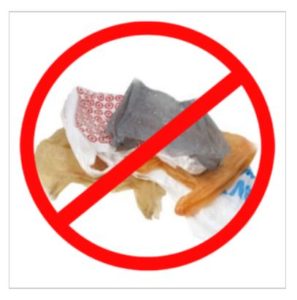New Year, New Resolution: Keep Plastic Bags and Plastic Wrap Out of Recycling
Below is a message from Seattle Public Utilities about recycling. Also, a message from another organization about other items not to put in the recycle bin.
As of January 1, 2020, plastic bags and plastic wrap will no longer be accepted in curbside recycling bins. For more information, check out the Q&A below for details:
Q: Why are plastic bags and plastic wrap not allowed in the recycling bin?
A: Plastic bags and plastic wrap are the most problematic materials for recycling processors. When thin plastics, like bags and wrap, get tangled in recycling equipment, the processing facility has to shut down. Stopping the equipment to remove the plastic slows processing down, drives up costs, and is a potential safety risk for workers.

Q: How should I dispose of plastic bags and plastic wrap?
A: You have a couple of options:
1) Take them to a drop-off location to be recycled (as long as they’re clean and dry). To find a drop-off location near you, go to www.plasticfilmrecycling.org.
2) Put them in the garbage.
Q: What exactly do you mean by plastic bags and wrap?
A: Plastic bags include grocery bags, produce bags, bread bags, and zip-top sandwich bags, along with shipping pillows and bubble wrap. Plastic wrap is typically used as packaging for items like paper towels or toilet paper, as well as lightweight dry cleaning bags and most other thin, flexible plastic.
Q: Does this mean I should stop bagging my recycling?
A: Yes! Recyclables should be placed loose in your recycling bin. So-called “recycling bags” are unnecessary if your recycling is Empty, Clean, and Dry and actually make it much harder for workers to sort materials when they arrive at the recycling facility.
To learn more about the new standards for recycling, including keeping plastic bags and wrap out of the recycling cart, go to www.seattle.gov/utilities/recyclerig
